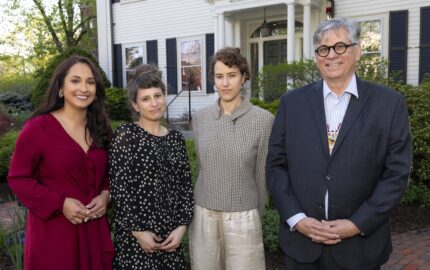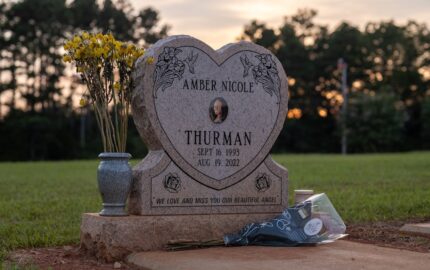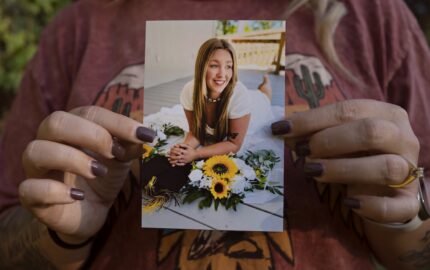Max du Preez of South Africa and Gitobu Imanyara of Kenya have won the 1991 Louis M. Lyons Award for conscience and integrity in journalism, the Nieman Foundation at Harvard University announced July 1, 1991.
The 22-member Nieman Fellow Class of 1991 selected the two journalists for their courageous efforts to gain democratic freedoms for their countrymen-even as each man faced grave threats to his life and liberty.
Imanyara, editor of the Nairobi Law Monthly, has been imprisoned three times during the last year by the regime of Kenya's president, Daniel arap Moi. Imanyara, 37, was freed May 28, nearly three months after the state jailed him on sedition charges.
Du Preez, 40, continues to face lawsuits and threats of violence for the work of his Vrye Weekblad (Independent Weekly Journal), South Africa's first ever independent Afrikaans-language newspaper.
The award was presented September in Cambridge.
This year's award marks the fourth time that the Nieman Fellows have recognized work in South Africa. Past Lyons Award winners there include Zwelakhe Sisulu of New Nation; Allister Sparks, correspondent for the London Observer and The Washington Post, and Joseph Thloloe of the Sowetan.
Du Preez founded his weekly in November 1988 after concluding that Afrikaners represented the biggest barrier to democracy in South Africa and that Afrikaans-language newspapers, so closely associated with apartheid and the ruling National Party government, were doing little to stimulate change. Afrikaans is Du Preez's native tongue; he grew up in a conservative, rural Afrikaner community.
Today Vrye Weekblad, with a staff of 28, sells 15,000 copies. "Despite a very limited resources base, the Vrye Weekblad has time and again come up with reports of corruption and brutality on both sides of the political fence," Richard S. Steyn, editor-in-chief of The Johannesburg Star, wrote in nominating du Preez for the Lyons Award.
"From exposing the existence of SWAPO torture camps in Namibia to revealing wide-scale corruption in black local government and in the homelands system, du Preez has been at the forefront of South African investigative journalism. Most notable, however, has been the newspaper's exposure of South African death squads in the police and military," wrote Steyn.
Du Preez's enemies have tried to intimidate him. Right-wing whites,tried to blow up his office in July 1990. He continues to receive threats by letter and phone, he says. And government officials have attacked his weekly with state-sponsored lawsuits alleging defamation and prosecutions for supposedly breaking government restrictions on what the press may publish.
Imanyara's law monthly, founded in September 1987 and now selling 20,000 copies, offers a platform to critics of the one- party regime of President Moi. The monthly has pressed for an end to Moi's single party state, and it has called attention to abuses of legal and human rights in a nation once thought of as a model African democracy. For that, the law monthly has found itself fighting for its life.
Imanyara spent three weeks in detention last summer and another week in September 1990, and yet he continued to challenge the government with the law monthly. This spring, its articles prompted Imanyara's arrest once again, the third in a year's time. He was imprisoned nearly three months, spending half of it in solitary confinement in a damp, dimly lit cell and the other half in a hospital where he had been taken after suffering an apparent seizure. Although the most recent sedition charges against him were dropped upon his release May 28, he still faces criminal prosecution by the government on an accusation dating back about seven years. The government has confiscated his passport and refused to allow him to travel abroad. And Imanyara must continue to stave off the Moi regime's year-old effort to ban his publication, which has a staff of about seven.
"We shall continue to provide the forum through which Kenyans may debate the kind of society they want to live in," Imanyara said in a telephone interview from his office in Nairobi.
The 22-member Nieman Fellow Class of 1991 selected the two journalists for their courageous efforts to gain democratic freedoms for their countrymen-even as each man faced grave threats to his life and liberty.
Imanyara, editor of the Nairobi Law Monthly, has been imprisoned three times during the last year by the regime of Kenya's president, Daniel arap Moi. Imanyara, 37, was freed May 28, nearly three months after the state jailed him on sedition charges.
Du Preez, 40, continues to face lawsuits and threats of violence for the work of his Vrye Weekblad (Independent Weekly Journal), South Africa's first ever independent Afrikaans-language newspaper.
The award was presented September in Cambridge.
This year's award marks the fourth time that the Nieman Fellows have recognized work in South Africa. Past Lyons Award winners there include Zwelakhe Sisulu of New Nation; Allister Sparks, correspondent for the London Observer and The Washington Post, and Joseph Thloloe of the Sowetan.
Du Preez founded his weekly in November 1988 after concluding that Afrikaners represented the biggest barrier to democracy in South Africa and that Afrikaans-language newspapers, so closely associated with apartheid and the ruling National Party government, were doing little to stimulate change. Afrikaans is Du Preez's native tongue; he grew up in a conservative, rural Afrikaner community.
Today Vrye Weekblad, with a staff of 28, sells 15,000 copies. "Despite a very limited resources base, the Vrye Weekblad has time and again come up with reports of corruption and brutality on both sides of the political fence," Richard S. Steyn, editor-in-chief of The Johannesburg Star, wrote in nominating du Preez for the Lyons Award.
"From exposing the existence of SWAPO torture camps in Namibia to revealing wide-scale corruption in black local government and in the homelands system, du Preez has been at the forefront of South African investigative journalism. Most notable, however, has been the newspaper's exposure of South African death squads in the police and military," wrote Steyn.
Du Preez's enemies have tried to intimidate him. Right-wing whites,tried to blow up his office in July 1990. He continues to receive threats by letter and phone, he says. And government officials have attacked his weekly with state-sponsored lawsuits alleging defamation and prosecutions for supposedly breaking government restrictions on what the press may publish.
Imanyara's law monthly, founded in September 1987 and now selling 20,000 copies, offers a platform to critics of the one- party regime of President Moi. The monthly has pressed for an end to Moi's single party state, and it has called attention to abuses of legal and human rights in a nation once thought of as a model African democracy. For that, the law monthly has found itself fighting for its life.
Imanyara spent three weeks in detention last summer and another week in September 1990, and yet he continued to challenge the government with the law monthly. This spring, its articles prompted Imanyara's arrest once again, the third in a year's time. He was imprisoned nearly three months, spending half of it in solitary confinement in a damp, dimly lit cell and the other half in a hospital where he had been taken after suffering an apparent seizure. Although the most recent sedition charges against him were dropped upon his release May 28, he still faces criminal prosecution by the government on an accusation dating back about seven years. The government has confiscated his passport and refused to allow him to travel abroad. And Imanyara must continue to stave off the Moi regime's year-old effort to ban his publication, which has a staff of about seven.
"We shall continue to provide the forum through which Kenyans may debate the kind of society they want to live in," Imanyara said in a telephone interview from his office in Nairobi.


